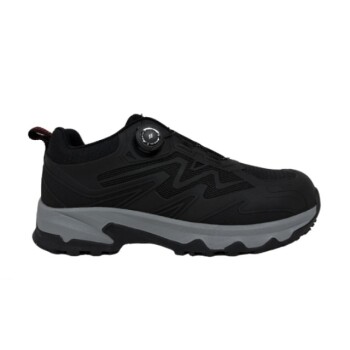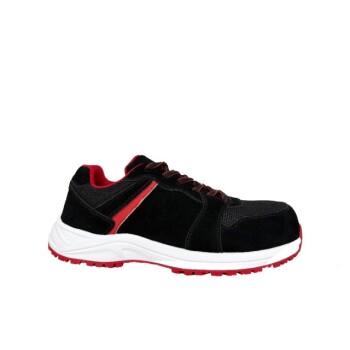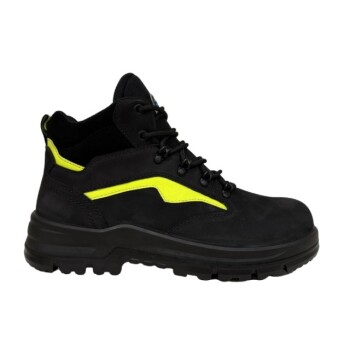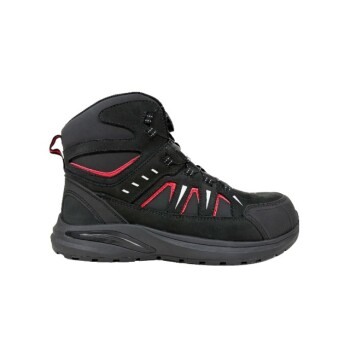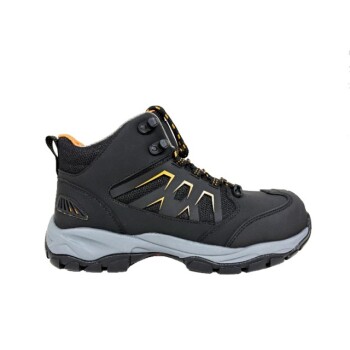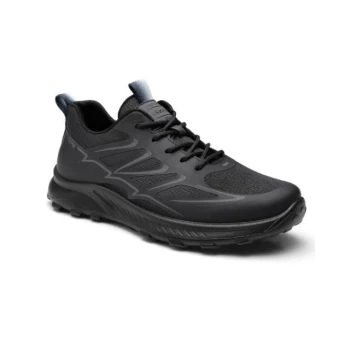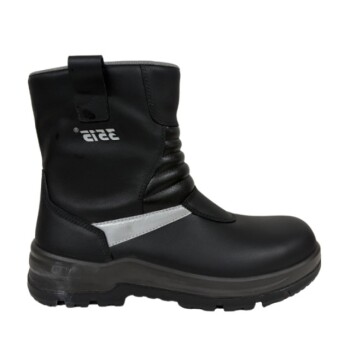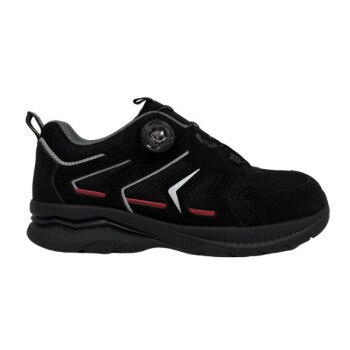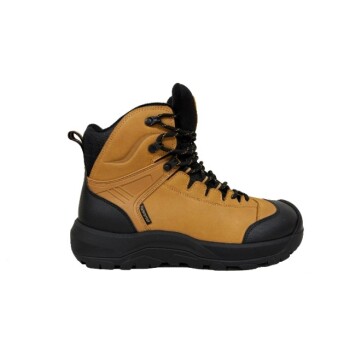At a minimum, industries like food service, healthcare, construction, manufacturing, law enforcement, and transportation should enforce the use of slip-resistant footwear. These sectors are characterized by work environments where floors are frequently exposed to water, grease, oil, or other liquids that create significant slip-and-fall hazards.
The decision to mandate slip-resistant footwear should not be based on an industry classification alone. The true determining factor is a direct assessment of the specific slip hazards present in your unique work environment.
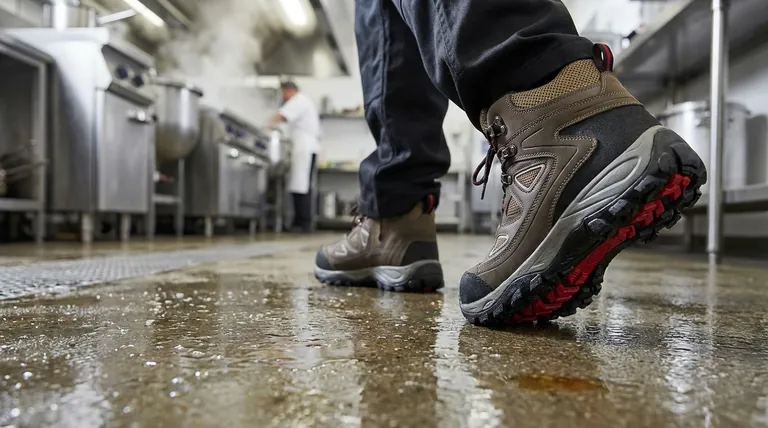
The Principle: It's About Risk, Not Just Industry
Mandating safety equipment is fundamentally about risk mitigation. While certain industries are clear candidates, the core task is to identify the specific job functions and conditions that create danger.
The Role of Surface Conditions
The primary hazard is the walking surface itself. Any environment where floors are regularly wet, oily, or polished presents a continuous risk.
This includes obvious culprits like commercial kitchens with grease and food spills or hospital corridors with cleaning fluids.
It also extends to outdoor work where employees encounter rain, snow, and ice, which are common for delivery drivers or construction workers.
The Task Defines the Hazard
Beyond the surface, the employee's activity is a critical factor. An office worker in a manufacturing plant has a different risk profile than a machinist on the factory floor.
Carrying heavy or awkward loads, moving quickly, and pushing or pulling carts all increase the likelihood of a slip becoming a serious fall.
A Closer Look at High-Risk Sectors
Understanding why these industries are high-risk provides a better framework for assessing your own workplace.
Food Service and Hospitality
This sector combines fast-paced work with constant exposure to water, grease, and food spills in kitchens and serving areas. The risk is persistent throughout every shift.
Healthcare
Hospitals and clinics feature smooth, polished floors that are regularly cleaned. Spills of water, cleaning solutions, and bodily fluids create unpredictable slip hazards for staff who must often move quickly.
Construction and Manufacturing
These environments present a mix of hazards. Workers face exposure to water, machine oils, and loose debris on uneven or unfinished surfaces.
Transportation and Delivery
Delivery drivers and logistics personnel constantly move between controlled indoor environments and uncontrolled outdoor conditions. They must navigate wet pavement, ice, and snow, making slip-resistant footwear essential.
Law Enforcement and First Responders
Like delivery drivers, these professionals work in unpredictable environments. However, the urgency of emergency situations significantly increases their risk of a slip-and-fall injury.
Understanding the Trade-offs
Slip resistance is often just one component of a comprehensive safety footwear program. A proper risk assessment must consider all potential hazards.
Impact and Puncture Protection
For industries like construction and manufacturing, protection from falling objects or sharp debris on the ground is paramount. Safety-toe and puncture-resistant features are non-negotiable, in addition to slip resistance.
Electrical Hazard Protection
For electricians or maintenance workers, footwear must be rated to protect against electrical shock. This is a specialized feature that must be sought out alongside a slip-resistant sole.
Cost vs. Prevention
While higher-rated, multi-feature safety shoes may have a higher upfront cost, they are a critical investment. The cost of a single serious workplace injury far outweighs the expense of providing proper personal protective equipment.
How to Determine Your Workplace's Needs
Use your specific environmental hazards as the primary guide for selecting and mandating footwear.
- If your environment has frequent liquid spills (kitchens, hospitals): Prioritize footwear with the highest rating for oily and wet surface traction.
- If your workers are frequently outdoors (delivery, construction): Focus on footwear with a deep, rugged tread designed to handle water, mud, and ice.
- If your workplace includes impact or electrical hazards (manufacturing, electrical work): Ensure footwear has the necessary safety-toe or electrical hazard rating first, with slip resistance as a required secondary feature.
Ultimately, conducting a thorough risk assessment of your specific job sites is the only way to ensure worker safety.
Summary Table:
| High-Risk Industry | Primary Slip Hazards | Key Footwear Considerations |
|---|---|---|
| Food Service & Hospitality | Grease, water, food spills | High traction on oily/wet surfaces |
| Healthcare | Polished floors, cleaning fluids, spills | Slip resistance for quick movement |
| Construction & Manufacturing | Water, oil, debris on uneven surfaces | Slip resistance + safety toe/puncture protection |
| Transportation & Delivery | Rain, ice, snow, wet pavement | Deep, rugged tread for outdoor conditions |
| Law Enforcement & First Responders | Unpredictable surfaces, urgent movement | Durable slip resistance for high-stress scenarios |
Protect your team with the right safety footwear.
As a large-scale manufacturer, 3515 produces a comprehensive range of slip-resistant and safety footwear for distributors, brand owners, and bulk clients. Our production capabilities encompass all types of occupational shoes and boots, designed to meet the specific hazards of your industry—from superior wet traction to composite safety toes.
Let us help you mitigate risk and prevent workplace injuries. Contact our experts today for a consultation on your specific safety footwear needs.
Visual Guide
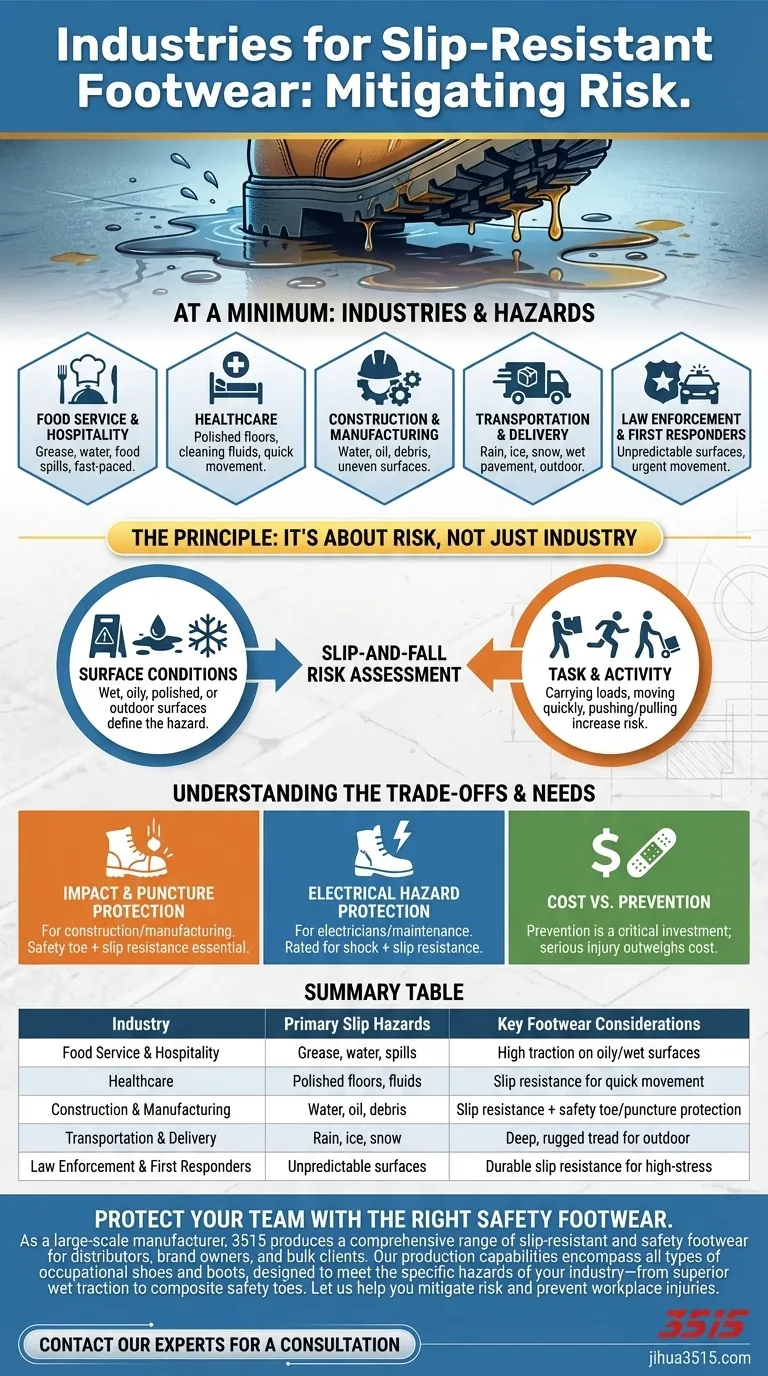
Related Products
- Safety Footwear Wholesale Manufacturer for Custom OEM/ODM Production
- Advanced KPU Athletic Safety Shoe with Steel Toe Cap Anti-Slip Rotary Lacing System
- Premium Suede Sport Safety Shoes for Wholesale & Bulk Orders
- Wholesale Premium Waterproof Nubuck Safety Shoes Boots
- Heavy Duty Nubuck Safety Boots Safety Shoes for Global Distribution
People Also Ask
- What role does a digital surface roughness tester play in evaluating footwear? Expert Insights for Slip Resistance
- What type of midsoles are used in men's work shoes to prevent foot injuries? Steel vs. Composite for Ultimate Safety
- What is the primary role of industrial-grade 3D printing in shoe last & insole research? Enhance Your Slip-Resistance
- What types of workers commonly rely on slip resistant shoes? Protect Your Workforce from Slips and Falls
- How do slip-resistant shoes enhance productivity in the kitchen? Boost Safety and Efficiency for Your Team
- What factors should be considered when purchasing slip resistant shoes? A Guide to Maximum Safety & Comfort
- Why are non-slip shoes considered versatile? Engineered for Safety from Work to Weekend
- How do chef clogs differ from regular non-slip shoes? A Guide to Professional Kitchen Footwear

